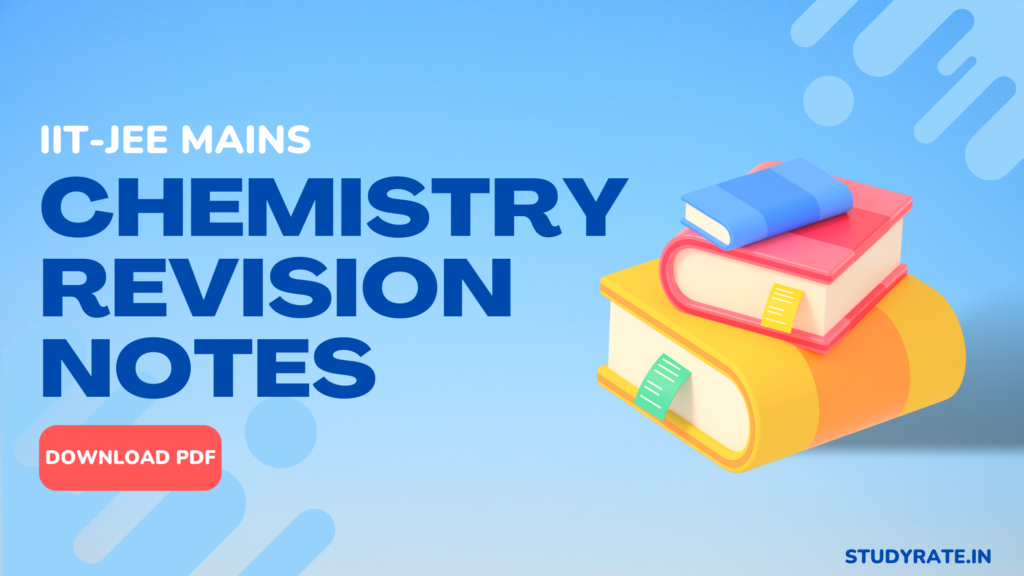Are you preparing for the JEE Mains Chemistry exam? Looking for a quick and effective way to revise important topics? Look no further! In this article, we will explore the significance of JEE Mains Chemistry short revision notes and how they can help you ace your exams. Whether you are a beginner or in the final stages of your preparation, these revision notes will prove to be an invaluable resource.
In this article, we will give you the best Revision notes of Chemistry(All Chapters) for the preparation of NEET, JEE, AIIMS, and Other competitive Exams and also for Boards.
JEE Mains Chemistry is a vast subject that requires in-depth understanding and thorough preparation. As an aspirant, you need to cover a wide range of topics, including inorganic, organic, and physical chemistry. Amidst this extensive syllabus, revision becomes crucial to retain and recalling important concepts effectively. This is where JEE Mains Chemistry short revision notes come to your rescue.

JEE Mains Chemistry Last Minute Notes PDF
This chemistry Short and Quick Handwritten Revision notes will help you to score 99%ile in JEE Mains and got qualified for JEE Advanced. We at Study Rate try hard to provide you best quality Notes for your competitive exams. We believe that short notes for JEE will help JEE aspirants to get a good understanding of the concepts and also remember the key points from an exam point of view.
Key Topics Covered in JEE Mains Chemistry Revision Notes
The JEE Mains Chemistry short revision notes cover all the essential topics that are part of the exam syllabus. Here are the key topics you can expect to find in these revision notes:
Inorganic Chemistry
- Atomic Structure and Chemical Bonding: Understand the fundamental concepts of atoms, molecules, chemical bonding, and their properties.
- Periodic Table and Periodicity: Explore the periodic trends, periodic properties, and elements’ characteristics based on their positions in the periodic table.
- Coordination Compounds: Learn about coordination compounds, their nomenclature, and their importance in chemistry.
Organic Chemistry
- Basic Concepts and Principles: Get a solid foundation in organic chemistry by understanding the basic concepts, principles, and techniques.
- Hydrocarbons: Study the various types of hydrocarbons, their structures, nomenclature, and important reactions.
- Organic Compounds Containing Oxygen and Nitrogen: Dive into the world of organic compounds that contain oxygen and nitrogen, including alcohols, phenols, ethers, and amines.
Physical Chemistry
- States of Matter: Explore the different states of matter, intermolecular forces, and their impact on physical properties.
- Thermodynamics and Thermochemistry: Gain insights into energy changes, heat transfer, enthalpy, entropy, and Gibbs free energy.
- Chemical Kinetics and Equilibrium: Learn about reaction rates, rate laws, factors affecting reaction rates, and chemical equilibrium.
These topics provide a solid foundation for your JEE Mains Chemistry preparation, and the revision notes ensure that you cover them comprehensively.
Chemistry Short Revision Notes
| Physical and Organic Chemistry | Download PDF |
| Inorganic Chemistry | Download PDF |
| Bharat Panchal Short Notes | View PDF |


Benefits of Using Short Revision Notes for JEE Mains Chemistry
Using JEE Mains Chemistry short revision notes offers several advantages. Let’s explore some of the key benefits:
- Time-saving: These notes provide a concise summary of each topic, allowing you to revise quickly and efficiently. Instead of going through extensive textbooks, you can focus on the essential points.
- Easy to understand: The revision notes are designed to simplify complex concepts. They provide clear explanations, examples, and diagrams, making it easier for you to grasp and remember the key information.
- Focused preparation: By using revision notes, you can identify and concentrate on the important topics that are likely to appear in the exam. This targeted approach saves you from getting overwhelmed by the vast syllabus.
- Quick recall: Revision notes help in reinforcing your learning by condensing the material into easily digestible chunks. This aids in quick recall during the exam and boosts your confidence.
- Portable and accessible: You can carry these revision notes with you anywhere, whether it’s on your smartphone, tablet, or printed form. This allows you to revise even when you are on the go, maximizing your study time.
How to Effectively Use JEE Mains Chemistry Short Revision Notes
To make the most of the JEE Mains Chemistry short revision notes, follow these tips:
- Create a study plan: Set aside dedicated time for revision in your study schedule. Allocate specific slots for each topic or chapter, ensuring you cover everything before the exam.
- Break it down: Divide the revision notes into smaller sections based on topics or subtopics. This will make the revision process more manageable and organized.
- Take notes: While going through the revision notes, jot down important points, formulas, and concepts in your own words. This active engagement helps in better understanding and retention.
- Practice with previous years’ questions: Use the revision notes as a reference while solving past year papers or practice questions. This will test your understanding and identify areas that need further revision.
- Revise regularly: Make revision a continuous process rather than a last-minute rush. Regularly revisit the revision notes to reinforce your knowledge and ensure long-term retention.
Tips for Creating Your Own Revision Notes
If you prefer creating your own revision notes, here are a few tips to make them effective:
- Be concise: Focus on the key concepts and essential information. Avoid lengthy explanations or unnecessary details that can clutter your notes.
- Use headings and subheadings: Organize your notes using headings and subheadings for each topic. This helps in quickly locating specific information during revision.
- Use diagrams and mnemonics: Visual aids such as diagrams, flowcharts, and mnemonics can enhance your understanding and aid in memory recall.
- Include examples and practice questions: Supplement your notes with relevant examples and practice questions to reinforce your learning and test your understanding.
- Review and update: Regularly review and update your revision notes as you progress through your preparation. This ensures that your notes stay up to date and reflect your current knowledge.
In conclusion, JEE Mains Chemistry short revision notes are a valuable resource for effective exam preparation. They save time, simplify complex concepts, and provide focused learning. Whether you choose pre-made revision notes or create your own, incorporating them into your study routine will enhance your understanding and improve your chances of success in the JEE Mains Chemistry exam.
Important Chapters and Topics For Chemistry
| High Weightage | Low Weightage |
|---|---|
| Atomic Structure | Chemical Equilibrium |
| Gaseous & Liquid State | Redox & Volumetric Analysis |
| Electrochemistry | Solutions |
| Chemical Kinetics | Metallurgy |
| Nuclear & Surface Chemistry | Qualitative Analysis |
| Chemical Bonding | Hydrocarbons |
| d-Block Elements | Mole Concept |
| Co-ordination Compound | Ionic Equilibrium |
| Alkyl Halides | Solid State |
| Aromatic Compounds | s-Block Elements |
| Thermodynamics | Periodic Classification |
| p-Block Elements | Classification & Nomenclature |
| General Organic Chemistry | Alcohol & Ether |
| Isomerism | Nitrogen Compounds & Aliphatic Amines |
| Aldehydes and Ketones | Biomolecules & Polymers |
| Carboxylic Acids & Its Derivatives |
Chemistry EASY AND IMPORTANT CHAPTERS
- Mole concept- 4 marks
- Solid-state – 4 marks
- Solution – 4 marks
- Biomolecules- 4 marks
- Polymer- 4 marks
- Atomic structure- 4 marks
- Chemical Bonding- 4/8 marks
- Chemical kinetics- 4 marks
- Thermodynamics and Thermochemistry- 8 marks
- Surface chemistry + Metallurgy + real Gas + Chem in Every day – 12 marks
FAQs about Chemistry Revision Short Notes
You can download the best short and quick Revision Notes of Chemistry for JEE Mains on studyrate.in
It is difficult to crack JEE Main in 15 days. You can try to score good marks in your exam to be motivated and determined. You can focus on important topics which carry more weight in the exam.
Revision notes are an excellent supplementary resource, but it is recommended to study the complete syllabus and understand the underlying concepts in depth.
StudyRate provides the Chemistry Revision Notes that are prepared by the subject matter experts.
The revision notes cover the key topics and concepts required for the JEE Mains Chemistry exam. However, it is advisable to consult additional study materials for a more comprehensive understanding.
Yes, the revision notes are designed to be concise and easily digestible, making them ideal for quick revisions and last-minute brush-ups.

